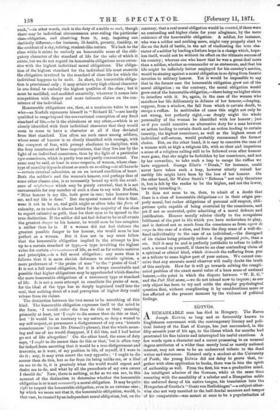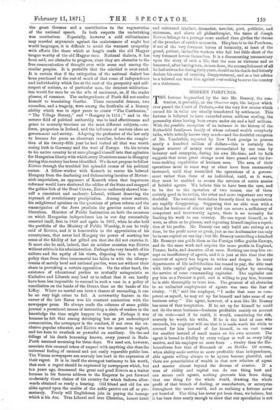EbTVOS.
REMARKABLE man has died in Hungary. The Baron A Joseph Etitvtis, so long and so favourably known to Englishmen conversant, with the contemporary literary and poli- tical history of the East of Europe, has just succumbed; in the fifty-seventh year of his age, to the illness which for months had prostrated his fine talents and interrupted his useful exertions. A few words upon a character and a career possessing in an unusual degree attributes of a wider than merely local or merely national interest, may not seem to be an undeserved tribute to the dead writer and statesman. Entered early a student at the University of Pesth, the young Eiitvos did not delay to prove that, to- gether with close application to books, there was in him the spirit of authorship as well. From the first, his was a productive mind. An intelligent admirer of the German, while at the same time resenting with the sensibility of a scholar and a Hungarian noble the enforced decay of his native tongue, his translation into the Hungarian of Goethe's " Goetz von Berlichingen"—a subject other- wise also not very unsuited to the half-feudal manners and temper of his compatriots—was meant at once to be a popularization of
the great German and a contribution to the regeneration of the national speech. In both respects the undertaking was meritorious. Especially, however a cold utilitarianism may marshal arguments against the maintenance of aught but world-languages, it is difficult to avoid the warmest sympathy with efforts like those which at length made the old Magyar tongue worthy of the old Magyar race. National dialects, it has been said, are obstacles to progress, since they are obstacles to the free communication of thought over wide areas and among dis- similar peoples. It is probable that the mischief is over-rated. it is certain that if the extirpation of the national dialect has been purchased at the cost of much of that sense of independence -and individuality which lies at the root of the prosperity and self- respect of nations, as of particular men, the strictest utilitarian- -.ism would for once be on the side of sentiment, or, if the reader pleases, of romance. The undergraduate of Pesth did not confine himself to translating Goethe. Three successful dramas, two -comedies, and a tragedy, were among the firstfruits of a literary ability which was in riper years to create "The Carthusian," " The Village Notary," and " Hungary in 1514 ; " and in the -severer field of political authorship was to lend effectiveness and grace to masterly treatises on the most different subjects,—re- -.form, pauperism in Ireland, and the influence of modern ideas on government and society. Adopting the profession of the law only to become for years an observant traveller, before the comple- tion of his twenty-fifth year he had visited all that was worth .seeing both in Germany and the west of Europe. On his return to his native country he at once plunged himself into that agitation for Hungarian liberty with which every illustrious name in Hungary -during this century has been identified. We do not propose to follow Etitvos through the troubled but splendid scenes of his political -career. A fellow-worker with Kossuth to rescue his beloved Hungary from the deadening and dishonouring incubus of Metter-
• nich imperialism, an opponent of Kossuth when that impetuous -reformer would have shattered the edifice of the State and snapped the golden link of the Dual Crown, Eotvos uniformly showed him- self a consistent and moderate Liberal, without deserving the reproach of revolutionary precipitation. Among minor matters, -his enlightened opinions on the questions of prison reform and the emancipation of the Jews proclaim the genuine nature of his liberalism. Minister of Public Instruction on both the occasions -on which Hungarian independence has in our day successfully asserted itself, first in 1848 and again in 1867, when he also held the portfolio of the Ministry of Public Worship, it can be truly said of Eotvos, and it is honourable to the appreciation of his countrymen, that never had Hungary the power of marking her sense of the fidelity of her gifted son that she did not exercise it. It must also be said, indeed, that on neither occasion was Eotvos without critics in his administration. Perhaps the very breadth of his -culture and the equity of his views, disposing him to a larger policy than from time immemorial has fallen in with the idiosyn- .crasies of merely local and national parties, were not without their share in provoking a certain opposition. On the other hand, the existence of educational parties so mutually antagonistic as -Catholics and Liberals may lead us to reflect that it can hardly have been less impossible to succeed in such a case in a policy of conciliation on the banks of the Donau than on the banks of the Liffey. Where no mortal can have a chance of succeeding, it can be no very high crime to fail. A noteworthy feature in the career of the late Baron was his constant connection with the newspaper press. He always made the columns of some public journal a prominent means of instructing a circle of readers in the knowledge the time might happen to require. Perhaps it was because he felt that among developing but as yet undeveloped communities, the newspaper is the readiest, if not even the ex- clusive popular educator, and Etitviis was too earnest to neglect, and too keen to overlook so powerful an auxiliary. On the sad tidings of his death becoming known, every journal in Buda- Pesth assumed mourning for three days. We need not, however, -associate this unusual token of respect with anything else than the universal feeling of unusual and not easily reparable public loss. The Vienna newspapers are scarcely less load in the expression of their regret. It is in itself the strongest testimony to his worth, that such a regret should be expressed by newspapers which, but ten years ago, denounced the great and good Eotvos as a traitor because in his famous address to the Em_peror be put forward moderately those claims of his country for which Sadowa after- wards obtained so ready a hearing. Old friend and old foe are alike agreed upon the merits of the noble patriot cut off so pre- maturely. Freely will Englishmen join in paying the homage which is his due. True Liberal and true Christian, honest heart and cultivated intellect, dramatist, novelist, poet, publicist, and statesman, and above all philanthropist, the name of Joseph Eotviis belongs to a peerage more exalted than girdles the throne of the proudest of earth's monarchs. His place is in the Pantheon, if not of the very foremost heroes of humanity, at least of the grand, patient, invincible workers who fall but little short of the very foremost heroes themselves. It is a disconcerting commentary upon the story of such a life, that the man so virtuous and so honoured, after having seen, as men deem, the accomplishment of all he had striven for during forty years, should on his death-bed bitterly declare his sense of crushing disappointment, and as a last advice to a beloved son warn him against ever seeking to serve his country as a statesman.































 Previous page
Previous page